Introduction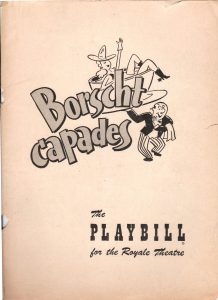
Borscht Capades was a Yiddish-English musical revue that ran from Fall 1948 through the mid 1950s.
Mickey Katz showcased his newly written parody songs like, “Haym Ofen Range,” after its initial success and added comedians, an acrobat and dancers. It was Yiddish American Vaudeville. Borscht Capades began in Los Angles at the Wilshire Ebell Theatre and then traveled across America. In September of 1951 Borschat Capades opened at the Royale Theatre in New York for a six month run. Through the 1950s the show was revived and performed with some regularity in Los Angeles and other cities through the mid 1950s.
For Mickey Katz Borscht Capdes was a venue that allowed him to be an emcee and show off his comedic skills. Dressed up in cowboy duds at the Bar Mitzvah Ranch he lead many of his Western themed parodies making fun of Jewish life and its discomfort with the West and cowboy life. Some noted performers such as Jack Hillard, Phil Foster and the Barry Sisters were headliners making Borscht Capades an entertaining event.
History and Descriptions
Opening at the Wilshire Ebell Theatre for six performances and then being extended six months, Borscht Capdes certainly delighted audiences at that time. Darr Smith, drama critic of the Los Angeles Daily News in his November 10, 1948 review wrote, “It is not traditional Yiddish theatre, nor is it traditional Yiddish vaudeville. It’s more modern than either—a thing designed for people who understand little Yiddish or have a feeling for the richness of the language without knowing what it actually is.” Clearly the lively energy of the show and the conviction of the actors conveyed the meaning of the Yiddish.
The original cast consisted of: Mickey Katz and his “RCA Kosher Jammers”, Sylvia Goldberg, Sandy Silvers, Jackie Hillard, Phil Foster, Joey Kaye [Mickey Katz’s son now known as Joel Grey], Raasche, Patsy “Goldele” Abbott, and Jackie Green. Some of these cast members stayed with the show while it traveled throughout the US with Phil Foster, Jack Hillard and Patsy Abbott still part of the show on Broadway in New York. 044PB_Photo-Copy-Borscht-Capades-Playbill-1948-cropped
The format of Yiddish and Hebrew music, comedians and acts like an acrobat interspersed with Mickey Katz’s parodies was the model for all productions of Borscht Capades. After the six-month run in Los Angeles Borscht Capades traveled to San Diego, Portland, Seattle, Milwaukee, Cleveland,Detroit, St Paul Minneapolis, Pittsburgh, Toronto, Montreal, Columbus, Chicago and then Miami (Feb. – April 1951).
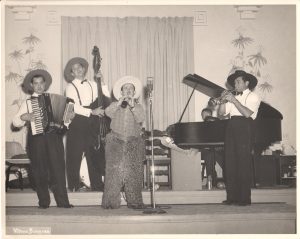
Mickey Katz and his “Kosher Jammers”
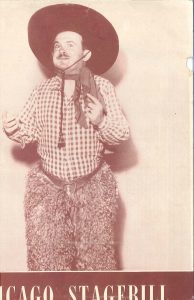
Mickey Katz Chicago Playbill
For the final run of the in Miami many of the Los Angeles performers were replaced. While Phil Foster and Joel Grey continued Bas Sheva (a female singer of cantorial music) and Jackie Hillard were added. When Borscht Capades got to Broadway at the Royale theatre in September 1951 the Barry Sisters were added to the show and Raasche and Patsy Abbot returned. Joel Grey was not part of the Broadway production.
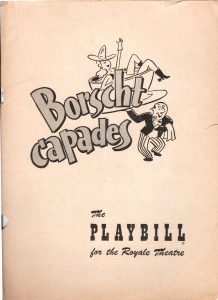
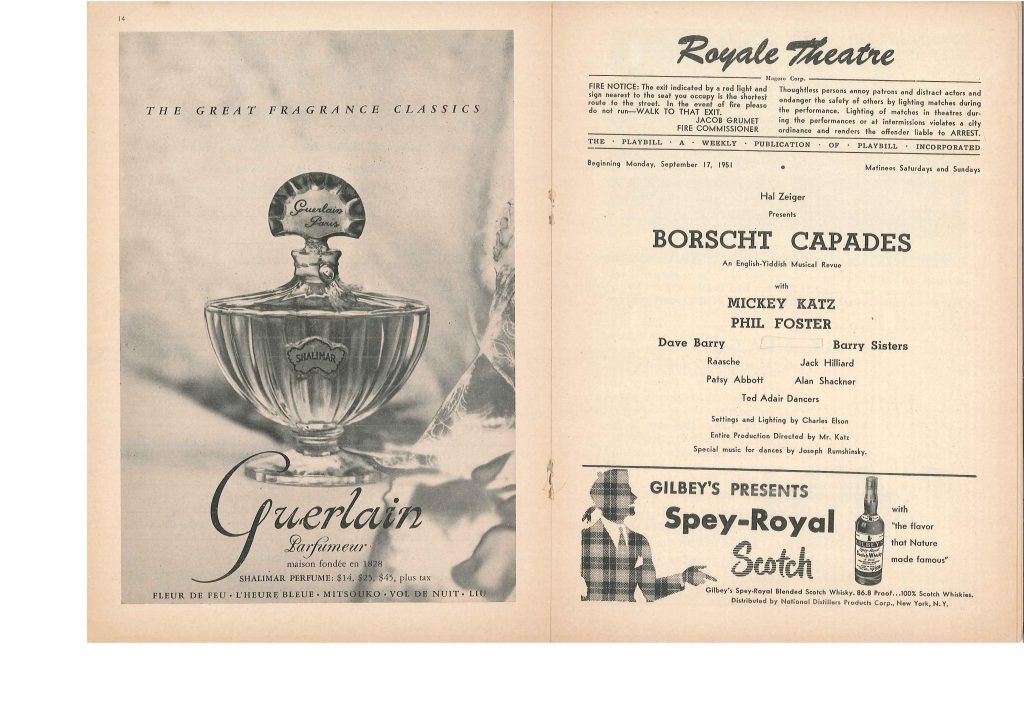
In October 1952 the show was renamed Farfel Follies and performed at the Biltmore Theatre. The cast included: Myron Cohen, Bas Sheva, Suzanne Narahara, Irviing Grossman, Dinah Goldberg and the Farfelettes. Lenny Kent was listed as an “extra added attraction”. The overall shape of the show was the same. Having new singers and comedians updated the production.
The-Playgoer-Farfel-Follies-Full-Playbill-PDF
Content
Comedy, singing, and entertaining acts, like an acrobat or ventriloquist, characterized the Broscht Capades productions.
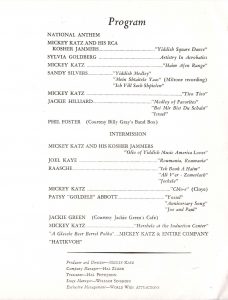 Mickey Katz was always listed as the producer and emcee with Hal Zeiger as the co-producer and manager. Mickey Katz’s four parody songs from his first two 78 rpm recordings were his featured contributions. The 1948-49 playbill lists “Yiddish Square Dance” as his first number, “Haim Afen Range” after acrobat Sylvia Goldberg and “Tico Tico” later and then “Chlo-e” in the middle of the second half.
Mickey Katz was always listed as the producer and emcee with Hal Zeiger as the co-producer and manager. Mickey Katz’s four parody songs from his first two 78 rpm recordings were his featured contributions. The 1948-49 playbill lists “Yiddish Square Dance” as his first number, “Haim Afen Range” after acrobat Sylvia Goldberg and “Tico Tico” later and then “Chlo-e” in the middle of the second half.
On this playbill toward the end Mickey Katz did a comedic routine called “Hershele at the Induction Center” which the Los Angeles Times 1949 reviewer remarked was full of joy. Sandy Silvers, Jackie Hillard and Patsy Abbot sang English and Yiddish songs. The 1949 Los Angeles times reviewer complemented Abbott’s singing “with a style all her own.” Raasche sang only Yiddish songs such as “Ich Benk a Haim,” “Ali V’er – Zemerlach” and “Jeckele”. Joel Grey listed as “Joel Kay” sang Lebedeff’s “Roumania Roumania” in the second half of the program. Phil Foster’s comedy was particularly noted in the Los Angeles Times Review: “a truly brilliant comic, who is warranted to break down any possible anti-laugh resistance with his monologue, especially the hat routine and his Brooklyn boy take-off.” The pre-final item was Mickey Katz and the entire company performing “A Glesele Beer Berrel Polka”. Hatikvoh [sic.] was the final song.
The traveling show had a significant run in Miami in the Winter of 1951. A review in Variety called the show “too long” but praised Jackie Hillard and the Bas Sheva, a female cantorial singer, she was seen as a “vocal standout.” Phil Foster was praised for his work. Joel Grey was noted for his dancing and Yiddish singing at 18 and he showed promise with a “strong Eddie Cantor influence.” A summary of Borscht Capades is found in the comments of the review in Variety seeing the show as having Broadway potential and that there was potential beyond the Yiddish speaking Jewish community:
It’s a hot bet for Broadway, and skillful selling should extend the show’s scope for potential trade beyond the Yiddish orbit because the basic values are there. Show will require punching up in its first half to match the strong second half. That this “fractured Yiddish” vaude-revue variation of “Fractured French” has a strong b.[ox] o.[ffice] market is evidenced by the $3 and $4 scale it has been getting.
The 1951 playbill for the Royale Theatre Broadway production shows a continued mix of comedy, singing and entertaining acts. Mickey Katz and Phil Foster are the headliners and Dave Barry and the Barry Sisters are listed next.

The Ted Adair Dances are listed on the program as well. Mickey Katz is credited as director and “Special music for dances” is by legendary Yiddish Theatre composer Joseph Rumshinsky. After the prologue Mickey Katz and Band with Ted Adair Dancers perform the “Yiddish Square Dance” followed by the “Yiddish Mule Train”; this latter song is an addition to Borscht Capades, since it is not listed in earlier playbills, for this Broadway production and was also recorded by Mickey Katz. “Geshry of the Vilde Katchke” is performed later by Mickey Katz. Raasche sang the “Lighting of the Sabbath Candle” and other selections not specified in the playbill.
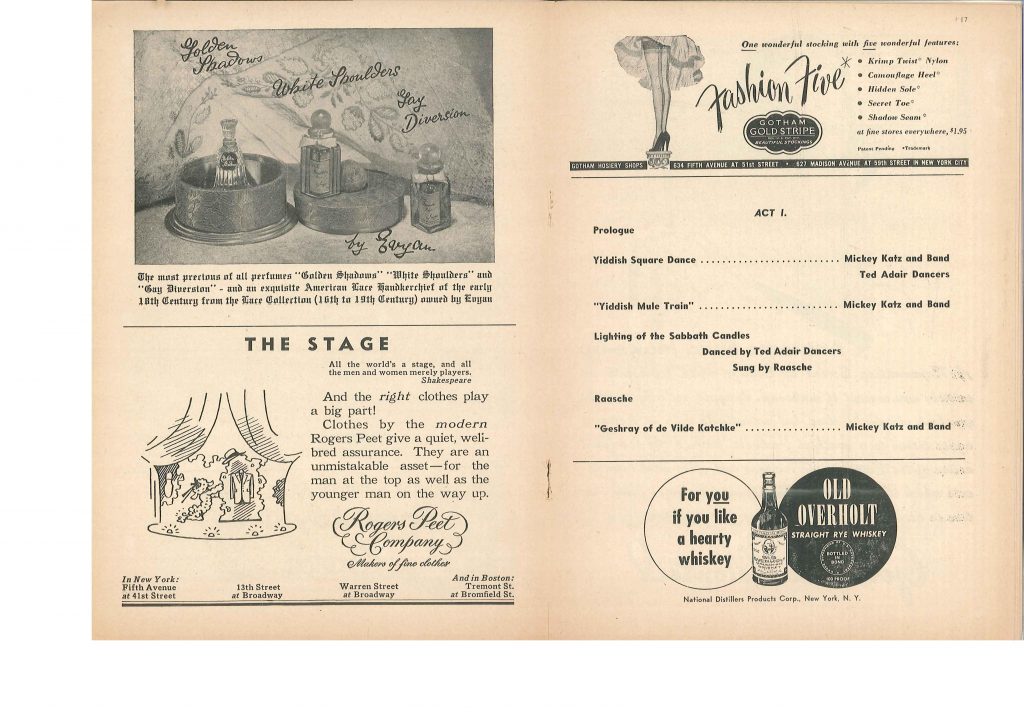
The Ted Adair Dancers perform at the end of the first half to a selection title “From Egypt to Israel” with four subcomponents: On the Nile, Shepherd Fantasy, Danse Chassidic and Israeli Hora. In the second half Mickey Katz and band performed “Olio of Yiddish music America Loves Best” with Patsy Abbott and Dave Barry performing followed by a Finale. It would be interesting to know if this second half on Broadway improved over the traveling version.
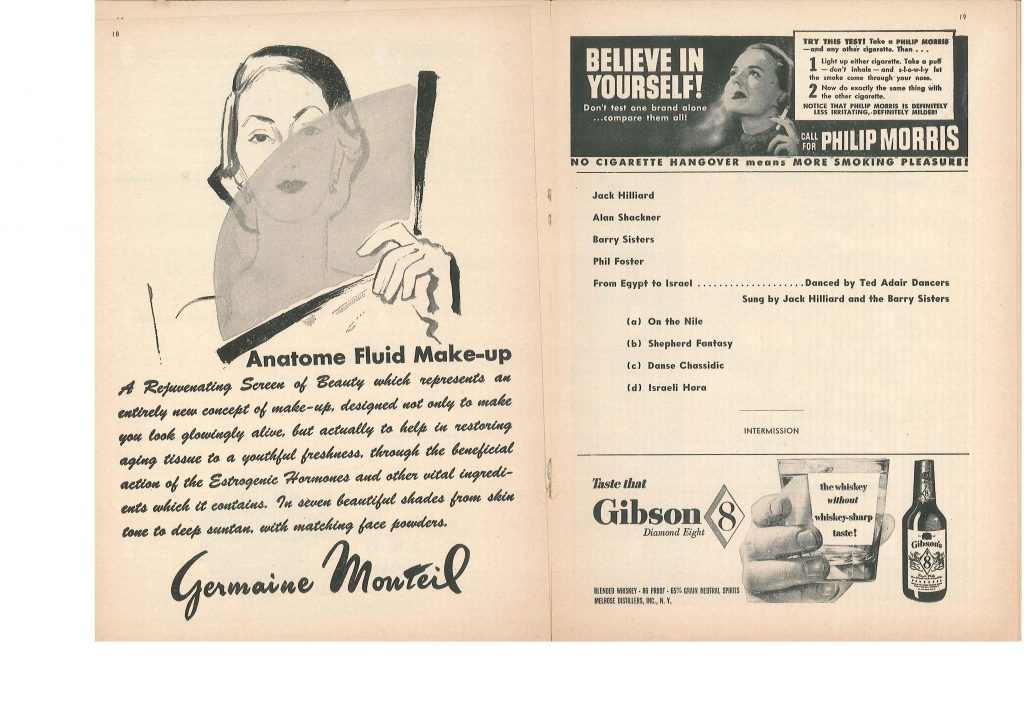
The New York Times review of Borscht Capades was seen as a pleasant family show and saw Phil Foster, Raasche an Dave Barry as the real talent with the other performers as “not distinguished and their material is commonplace.” The Barry Sisters, the reviewer comments had “well-developed luster as people, but agony singing with bucking and swaying in restless unison is pretty dismal in any language”. The Ted Adair dancers did not have any original ideas, according to the reviewer, and Joseph Rumshinsky, dubbed the “Dvorak of Second Avenue,” contributed pastiches of classical music, played by a good band that includes strings and clarinets as well as the usual bedlam. In conclusion the reviewer states:
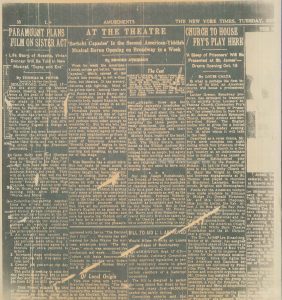
Perhaps Yiddish-speaking people will find “Borscht Capades” as hospitable and festive as Old Home Week. But in this department’s opinion, Mr. Foster, Mr. Barry and Miss Raasche represent the only first-rate talent in it. As theatre performers, they have something interesting to say.